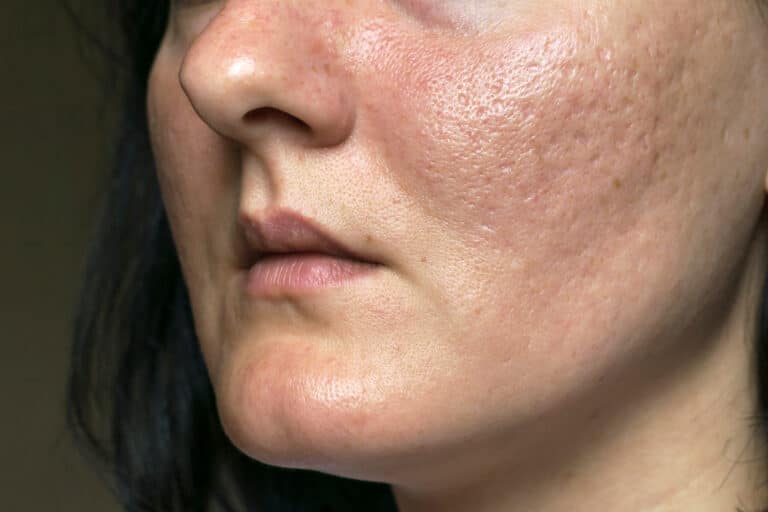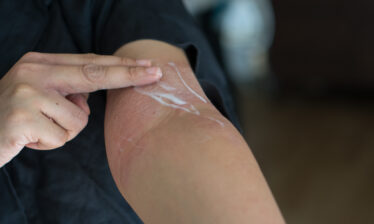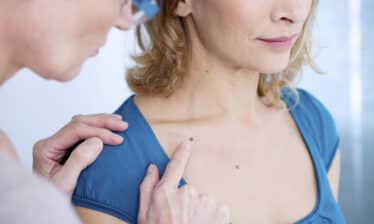Doctors have called acne the “nearly universal skin disease.” An estimated 79% to 95% of teens and young adults struggle with acne. Even after age 25, up to 54% of people get breakouts.1
When a breakout happens, it can be comforting to know that the acne will eventually fade. But what about those millions of people with scarring as permanent reminders of their acne?
According to one study, as many as 95% of acne patients — those who see doctors about their breakouts — end up with some degree of scarring.2 Scars are particularly upsetting because they feel permanent, but they don’t have to be.
If you have acne scars, treatments can help. Here’s what you need to know.
What Are Acne Scars?
Acne scars are areas of tissue that acne breakouts have damaged.
Acne Scar Causes
Scars develop when acne damages the deeper layers of skin.3 The body creates collagen to repair the damage, but sometimes it makes too much or too little. That’s when scarring happens.
You’re more likely to develop acne scars if you:
- Have cystic or other inflammatory acne (breakouts that are swollen and painful), especially if you don’t treat it
- Pick or squeeze acne breakouts, causing more inflammation
- Have a close relative with acne scars
Though these factors increase your risk, anyone can develop acne scars.
Acne Scar Types
Most acne scars fall into one of two categories:
- Atrophic scars are shallow, typically flat indentations in the skin.
- Hypertrophic and keloid scars are raised bumps of scar tissue, usually the same size as the pimple that caused them.
Some people with acne may also develop skin discolorations after a breakout. Dermatologists don’t consider this a scar as it typically fades on its own.
True acne scars are more stubborn. If you struggle with scarring from acne, some therapies may provide relief.
Acne Scars Medical Treatment
There are multiple non-invasive and minimally invasive options for acne scar treatment. These are a few of the most popular.
Dermal Fillers
If you have atrophic (indented) scarring, dermal fillers can help by adding volume to the affected area.
Fillers like hyaluronic acid and collagen have short-term effects, reducing the appearance of scars for three to 18 months.4 Other fillers, including silicon, can last much longer.
Ask a skin care specialist for personal recommendations.
Radiofrequency Microneedling
Radiofrequency microneedling is also a potential treatment for atrophic scarring. It creates new damage to the scarred tissue, encouraging the skin’s natural healing process.
In one study, 80% of patients showed significant clinical improvement, and another 19.35% showed moderate improvement.5
Chemical Peels
Chemical peels are a common treatment for multiple types of scarring. They work on atrophic acne scars by removing the outermost layer of skin. The underlying layer tends to be less visibly scarred.
Researchers have found chemical peels to be an effective and safe starter treatment for acne scars. They’re widely affordable and available in most dermatology offices and involve minimal downtime.6
Because chemical peels can cause discoloration, some experts recommend them primarily for lighter-skinned individuals. Birth control pills may also increase discoloration risk.7
Dermabrasion and Microdermabrasion
These treatment options use controlled skin scraping to reduce a scar’s appearance. Dermabrasion is the more intensive of the two. It removes the entire epidermis layer, prompting the skin to rebuild itself.
Although dermabrasion is a more invasive option than some other acne treatment scars, it can potentially treat deeper scars.8
Microdermabrasion is a painless outpatient procedure that patients can receive without anesthesia. It only removes the outer epidermal layer and is appropriate for shallower scars.
Over-the-Counter Topical Products
It’s possible to treat some acne scars at home without a prescription or in-office procedure.
Salicylic Acid
Salicylic acid is an effective but gentle peeling agent in many over-the-counter acne products. It can help break down the structure of acne scars and reduce their appearance.
Research suggests looking for a product containing 30% salicylic acid and applying it to your skin three to five times every three to four weeks.9
Salicylic acid has a low risk of discoloration, making it appropriate for darker skin.
Alpha hydroxy acid
Like salicylic acid, alpha hydroxy acids (AHAs) help remove damaged outer skin layers, revealing healthier layers underneath.
AHAs can also accelerate skin renewal by encouraging collagen production. This may help your skin look healthier faster.
AHA dosing can be challenging, as too-high doses can lead to side effects like burning and swelling.10
Retinoids
Retinoids are popular acne treatments because of their anti-inflammatory properties. According to one study, these properties also make retinoids an effective scarring therapy, improving the skin’s appearance and texture within 24 weeks.11
Retinoids are also effective at treating scar-related discoloration, even in darker-skinned patients.
Acne Scars Natural Treatment
Natural products may have weaker effects than medical treatments, but they can also help manage and reduce the appearance of scars.
Black Seed Oil
Black seed oil, or Nigella sativa, has multiple healing properties. It’s anti-inflammatory, antimicrobial, and immune-stimulating. In several studies, black seed oil accelerated wound healing by encouraging healthy tissue growth.12
Aloe Vera
Aloe vera is also a popular anti-inflammatory. It’s widely available and effectively reduces scarring when applied directly to wounds. A 2016 animal study reduced the size of treated scars and improved the appearance of new skin.13
Apple Cider Vinegar
Apple cider vinegar can serve as a gentle chemical peel to reduce the appearance of acne scars.14 However, the peeling mechanism may also irritate the skin. Always consult a dermatologist to reduce the risk of side effects.
Rosehip Oil
Rosehip oil comes from the fruit of a rose plant and is a known accelerator of wound healing. It can also improve the appearance of scars by promoting healthy tissue growth.15
Finding the Right Acne Scar Treatment: First Steps
You don’t have to live with acne scars forever. Commit to healthy skin and start a preventive regimen now. Wear sunscreen daily to reduce the appearance of scars, and reach out to a dermatologist.
Dermatologists are your strongest allies for any skin concern. They’ll consider your entire medical picture, including the severity of your scars, and recommend the best course of action.
Learn more about acne and acne scars at My Skin Treatment, then seek out a specialist in your area. Recapture your confidence today.
SOURCES:
- JAMA Dermatology: “Acne Vulgaris: A Disease of Western Civilization.“
- Clinical and Experimental Dermatology: “A clinical evaluation of acne scarring and its incidence.“
- American Academy of Dermatology Association: “Acne Scars: Who Gets and Causes.“
- Clinical, Cosmetic and Investigational Dermatology: “Fillers for the improvement in acne scars.“
- Journal of Cutaneous and Aesthetic Surgery: “Evaluation of Microneedling Fractional Radiofrequency Device for Treatment of Acne Scars.“
- Journal of Cutaneous and Aesthetic Surgery: “Chemical Peels for Acne and Acne Scars in Asians: Evidence Based Review.“
- American Society for Dermatologic Surgery: “Chemical Peels for Acne Scars.“
- The Journal of Clinical and Aesthetic Dermatology: “Effective Treatments of Atrophic Acne Scars.“
- Dermatology Research and Practice: “Acne Scars: Pathogenesis, Classification and Treatment.“
- Molecules: “Dual Effects of Alpha-Hydroxy Acids on the Skin.“
- Dermatology and Therapy: “Why Topical Retinoids Are Mainstay of Therapy for Acne.“
- Journal of Dermatology & Dermatologic Surgery: “Dermatological effects of Nigella sativa.“
- Annals of Plastic Surgery: “ Topical Application of Aloe vera Accelerated Wound Healing, Modeling, and Remodeling: An Experimental Study.“
- MedicalNewsToday: “Does apple cider vinegar have benefits for the face?“
- Planta Medica: “Rosehip Oil Promotes Excisional Wound Healing by Accelerating the Phenotypic Transition of Macrophages.“






